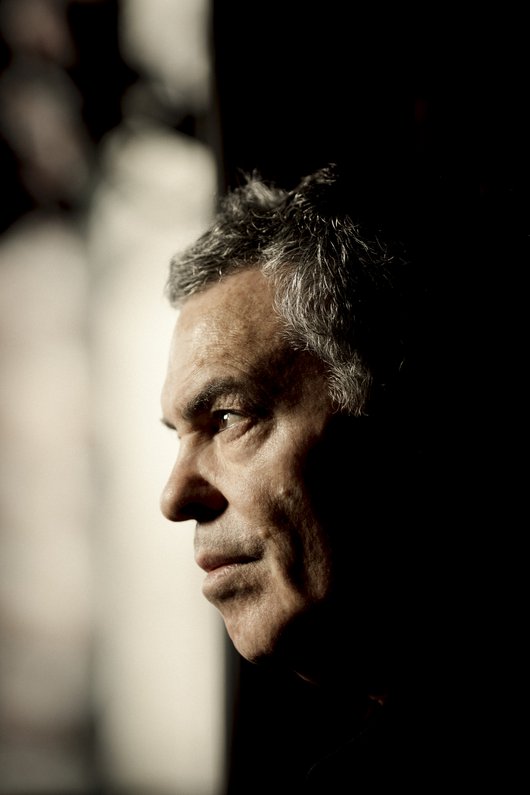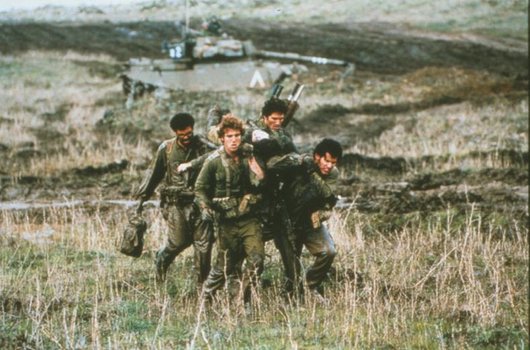Amos Gitai
Guest at Moviment
Amos Gitai is an artist and film-maker born in Haifa (Israel) in 1950.
The son of Munio Weinraub Gitai, a Bauhaus-trained architect, and Efratia Weinraub Gitai (Munschik), a teacher and intellectual, Amos Gitai began architecture studies at the Technion in Haifa, but was forced to suspend them during the Yom Kippur War (1973) to enlist with an airborne medical evacuation unit. He was injured when the helicopter he was flying in was struck by a Syrian missile. During his missions, he began using a Super 8 camera to film the war.
After 1973, and having graduated in architecture from Technion, he went to Berkeley University, USA, to do a PhD in architecture. On returning to Israel, he made his first documentary in 1980, House, which was intended for but censored by Israeli television. Censored once more for his documentary Field Diary (1982), Gitai moved to Paris where he would remain for almost ten years and shoot his first fiction films
He returned to Israel following the election of Prime Minister Yitzhak Rabin (1992), and launched into prolific work which includes numerous fictional and documentary films, in addition to exhibitions, plays, publications and conferences.
To date, Amos Gitai has produced more than 90 works for cinema, theatre, installations and art books. His films have been screened in several retrospectives, in particular at the Centre Pompidou in Paris, the Museum of Modern Art in New York, the Lincoln Center in New York and the British Film Institute in London.
Eleven of his films have been selected for the running at the Cannes and Venice international film festivals. He has received many prestigious awards, such as the Roberto Rossellini Award (2005), the Leopard of Honour at Locarno Film Festival, the Robert Bresson Prize (2013), the Paradjanov Award (2014), and the Lucchino Visconti Prize (2021).
He is an Officer of Arts & Letters, Knight of the Legion of Honour and Grand Officer of the Order of the Star of Italy. In 2018, Amos Gitai was elected professor to the Collège de France Artistic Creation Chair, with a series of 9 classes on film, followed by a seminar.
Amos Gitai
War Requiem
Cinema Installation, meetings, concerts
When the Yom Kippur War broke out in Israel, on 5 October 1973, Amos Gitai, a young architecture student, was assigned to a medical unit tasked with recovering the injured from the Golan Heights by helicopter. He almost died when his chopper was struck mid-flight by a Syrian missile on 11 October 1973, which also happened to be his 23rd birthday.
During the initial days of the war, Amos Gitai used a little Super 8 camera to film what he witnessed from the helicopter: faces, the texture of the earth, fragments of rescue operations. On leaving hospital, he began drawing faces obsessively, on every possible medium. He also filmed the uniform he was wearing when he was injured, draped on a hanger. His drawings and short films, Ahare (After) (1973) and Images of War (1974), document the violence of the trauma he suffered.
Then, he didn’t speak of it again.
Twenty-four years later, when he had become a filmmaker and the country looked to be heading for peace, he tracked down those who had been in the helicopter with him and made a documentary about them, Kippur. War Memories (1997). This was followed, in 2000, by Kippur, a feature-length work of fiction that took 27 years to make.
In 2023, fifty years after the war, his drawings are going on display for the first time, in an installation entitled War Requiem, designed by the Centre Pompidou as a visual, poetic and musical reflection on war and memory.
Saturday, 20 and Sunday, 21 May 2023


